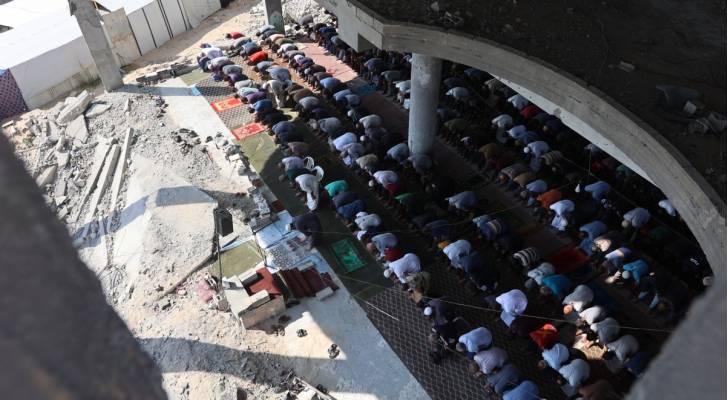Palestinian Muslim worshippers attend Friday prayers in Khan Younis (Credit: AFP)
Post-ceasefire Friday prayers resume in Gaza’s destroyed, surviving mosques
Thousands of Palestinians returned to Gaza’s few intact and many damaged mosques on Friday, as loudspeakers once again broadcast the Islamic call to prayer for the first time in months.
“God is the greatest, glory to God, Lord of worlds,” echoed through the mosques across the coastal territory, one week after a ceasefire brought a pause to the devastating genocide.
“To be united for prayer again is an indescribable feeling after two years of privation,” said Ghalid al-Nimra at Gaza City’s Sayed Hachem mosque, one of the city’s oldest houses of worship, which survived the air strikes largely intact.
Watching hundreds of worshippers gather for the first time since October 7, 2023, Nimra said he was moved by “such a large crowd gathered here.”
As the call to prayer rang out at 12:30 PM (0930 GMT), worshippers of all ages entered the mosque, their faces solemn, with the minbar, the imam’s raised platform, still standing amid the ruins.
Out of Gaza’s 1,244 mosques, 1,160 were partially or completely destroyed, according to Gaza's media office.
The return to communal prayer stirred a mix of emotions among residents.
“I feel like my soul is getting lost amid all this destruction,” said Abu Mahmud Salha, 52, from northern Gaza. Living in a displaced persons camp in Al-Mawasi, he added, “We pray inside the tent, I miss group prayer and the imam's voice. When I hear the prayer call echoing on loudspeakers from recordings, I feel like a part of our lives was broken.” His local mosque, al-Falluja, was destroyed, forcing him to pray in the street.
Many worshippers adapted to the conditions they have lived with in recent months. Some placed prayer mats on rubble, roads, or in partially collapsed mosques, while others prayed near tents housing thousands of displaced families.
“Every Friday, we try to gather on a small patch of land under the sky, to pray,” said Moataz Abu Sharbi, 27, displaced to Deir al-Balah. “Sometimes we pray on sand or on pieces of cardboard, which is very difficult psychologically. The mosque was a pillar of life in our neighborhoods and a precious part of our religious traditions. Losing both one's home and one's spiritual refuge, that's the hardest part.”
Abu Mohammad al-Hattab, 54, from Gaza City’s Al-Shati camp, reflected, “The mosque near my home was our refuge, not only for prayer, but also to find peace and remember God. When it was destroyed, it felt like a piece of my heart flew away.”
In southern Gaza, hundreds gathered at a destroyed mosque in Khan Younis. An imam led prayers through a loudspeaker while worshippers bowed amid gaping walls and exposed frames.
“We hope that everything will be rebuilt in Gaza, including the mosques,” said 22-year-old Salim al-Farra, as the community sought solace in their damaged but sacred spaces.




